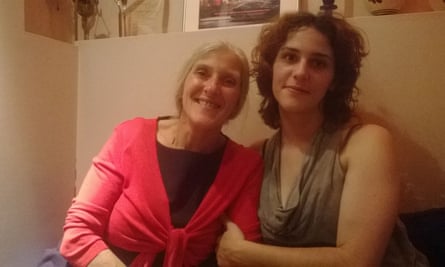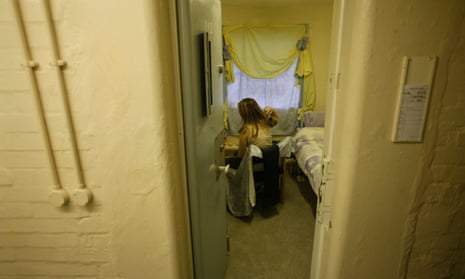Diane Coulson has two boxes of memorabilia relating to her daughter. She calls them the good and bad boxes. The former contains letters, photographs and poems she wrote. The bad box holds psychiatric reports and records of the inquest into her death.
Emily Hartley was 21 when she killed herself at HMP New Hall, a women’s prison in Wakefield, West Yorkshire, on 23 April 2016. She was six months into a two-year-and-eight-month sentence for arson, which she was given after she set herself on fire in an apparent suicide attempt.
“Whilst we were shocked to find Emily sent to prison, the one consolation was that we believed she would be kept safe,” said a statement from Coulson following an inquest into her death.

Hartley’s mental ill-health meant she was put on an ACCT (assessment, care in custody and teamwork) plan, designed to manage those identified as being at risk of suicide or self-harm. An investigation by the Guardian has found a sharp rise in the number of prisoners put on such plans, with the Prison Officers Association raising concerns that its members are insufficiently trained to deal with the scale of the problem.
Coulson says the photos of Emily as a youngster show an accurate reflection of her personality; bright, happy and confident. She was talented, enjoying media studies and drama at school, and displaying a way with words in her writing.
Her mum says Emily knew she was ill in the years before her death and desperately wanted help. But it was not readily available, if at all. Coulson speaks of spending whole nights in A&E departments waiting to be seen by a mental health nurse. The only other avenue emerged through the police, who would be called in on the occasions when her behaviour raised alarms.
In May 2015, using flammable nail polish remover, Emily set fire to herself and her bedding in her Leeds council flat. After being treated for severe chest burns, she was charged with arson and remanded to New Hall prison, near Wakefield. It was her first time in prison.
During the rest of that year, she was treated with anti-psychotic medication and a transfer to a secure hospital was considered. But medical opinion differed and she was deemed fit to plead.
In October, the probation service applied for a period back in the community to assess if she would be suitable for a non-custodial sentence and she was released to a hostel in Leeds.
The move was doomed to fail. The hostel was in an area Emily had frequented when addicted to heroin and most residents were on hard drugs. On 15 November, she was sentenced to two years and eight months in prison and returned to New Hall.
In the weeks before her death, Emily self-harmed, cutting herself and taking an overdose of another patient’s antibiotics. She asked 13 times to be put on antipsychotic medication, but was told it would not help her.
Eight days before she died, Emily was found with a ligature and showed a mental health nurse a suicide file with a letter “for who finds me”.
An inquest into Emily’s death concluded the prison had failed to properly implement her ACCT plan and “did not have sufficient training and therefore understanding of [her] condition”.
“Whilst we can empathise with the difficult and demanding job prison staff have, rigorous adherence to the ACCT process should be paramount,” the jury said in a narrative verdict.
A Prison Service spokesperson responded to the findings by saying the welfare of those in custody was their “absolute priority”. “HMP New Hall has taken urgent action to address the concerns raised, including reviewing care procedures for those most at risk and new suicide and self-harm training for staff,” they said.

Helen, a care worker from Lincoln, is terrified her son Adam will meet the same end as Emily. Adam has longstanding mental health problems and was sentenced in May 2019 to three years in jail for stealing a mobile phone – his first criminal conviction. Helen has lived every day since then in fear of a phone call telling her he’s killed himself.
When Adam, 43, was arrested and taken to the police station in the east Midlands, he insisted he had carried out the robbery at the request of the secret services. Helen said the decision that he was fit to be interviewed shocked the desk sergeant, to whom it was clear Adam should be sectioned under the Mental Health Act.
His lawyers commissioned a psychiatric assessment, which said he probably had bi-polar disorder, ADHD and possible borderline personality disorder. A prison doctor disagreed and the judge followed that line, although she acknowledged his mental state at the time of the offence. Helen said that assessment by the judge gave her hope the prison system would address her son’s obvious needs. That hope was not realised.
“I both long for and dread phone calls from Adam, for the obvious reason that he will inevitably be in deep distress and I will be powerless to help him. Ultimately I dread the phone call that says he has attempted or succeeded in taking his own life,” she said.
Adam’s state has only worsened since the onset of the pandemic and the new stricter regimes in prisons. He is only allowed out of his cell for showers and phone calls and has told his mother “it’s hard not to want to off yourself”.
Following distressing phone calls with her son, Helen has called the prison’s Safer Custody Line several times. Each time, she was told an appointment would be made with the wellbeing, or mental health team at the jail, but none materialised, and he has received little or no treatment.
Ruth Bundey, of Harrison Bundey Solicitors, represented Emily Hartley’s family at her inquest. She has represented families at inquests into the deaths of their loved ones for more than 30 years, but said the landscape has changed.
“In the early years, deaths in prison centred upon inadequate checks and assessments of the vulnerable, or dangerous restraint practices,” she said.
“Nowadays, mental ill-health is the backdrop to so many deaths, whether in prison, police or psychiatric detention, or for those subject to ‘care in the community’, whether adults or children.”
Coulson says she tries to “get on” with things since her daughter’s death. “But it never really goes away. I know I did my best for her: but my best wasn’t good enough, was it?” she said.
In the UK and Ireland, Samaritans can be contacted on 116 123 or email jo@samaritans.org or jo@samaritans.ie. In the US, the National Suicide Prevention Lifeline is 1-800-273-8255. In Australia, the crisis support service Lifeline is 13 11 14. Other international helplines can be found at www.befrienders.org.
